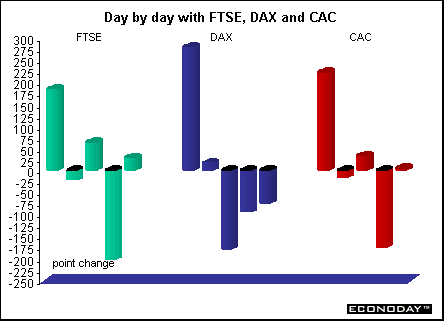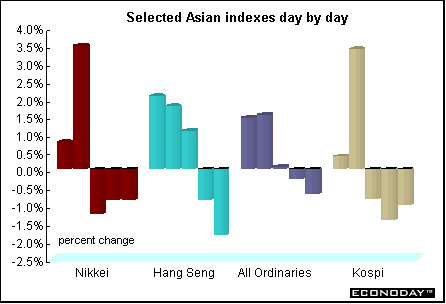 |

Europe and Britain
The London FTSE 100 and the Paris CAC regained their footing last week and rose for the first time since June, although enthusiasm for equities waned as the week wore on. Weak economic data added yet another uncertainty for investors to deal with. In London, the good news was that the number of British firms warning that they may miss profit forecasts has fallen to a two-year low, according to a survey from Ernst & Young. Many investors seem to agree that stocks are getting cheap, but after a two-year general decline that is now accelerating, few are willing to say that the momentum is about to turn around. For each positive sign for the market, another seems to point in the opposite direction.

Investors have plenty to worry about: the possible emergence of new scandals in the run-up to the Aug 14 deadline for U.S. firms to certify the accuracy of their financial reports; questions about the soundness of the European and U.S. economies; corporate profit warnings; concerns about tensions in the Mideast; etc. International markets continue to track those in the United States. But one international problem is homemade - the economy. Businesses are growing more pessimistic, especially those that rely on exports. In Europe, this is due in part to the strong euro that makes exports more expensive when priced in U.S. dollars.
Asia
All Asian equities indexes followed here were up on the week and in general are performing better than their European and American counterparts. However, this does not mean they are immune to investor reactions to U.S. economic data. With company livelihoods dependent on U.S. willingness to import Asian products, investors sold export-related stocks. In Japan, exporters not only rely on U.S. purchases but also worry that the appreciating yen will hurt profits when overseas' income is repatriated back to Japan. The Japanese economy grew in the first quarter of 2002 for the first time in over a year mostly based on exports and their secondary effects. Export worries also hit the South Korean Kospi, the best performing index followed here.



Last Week's Highlights • Global Stock Market Indexes • Recap of Global Markets • Currencies • Indicator Scoreboard

The Bottom Line • Looking Ahead
|
 |